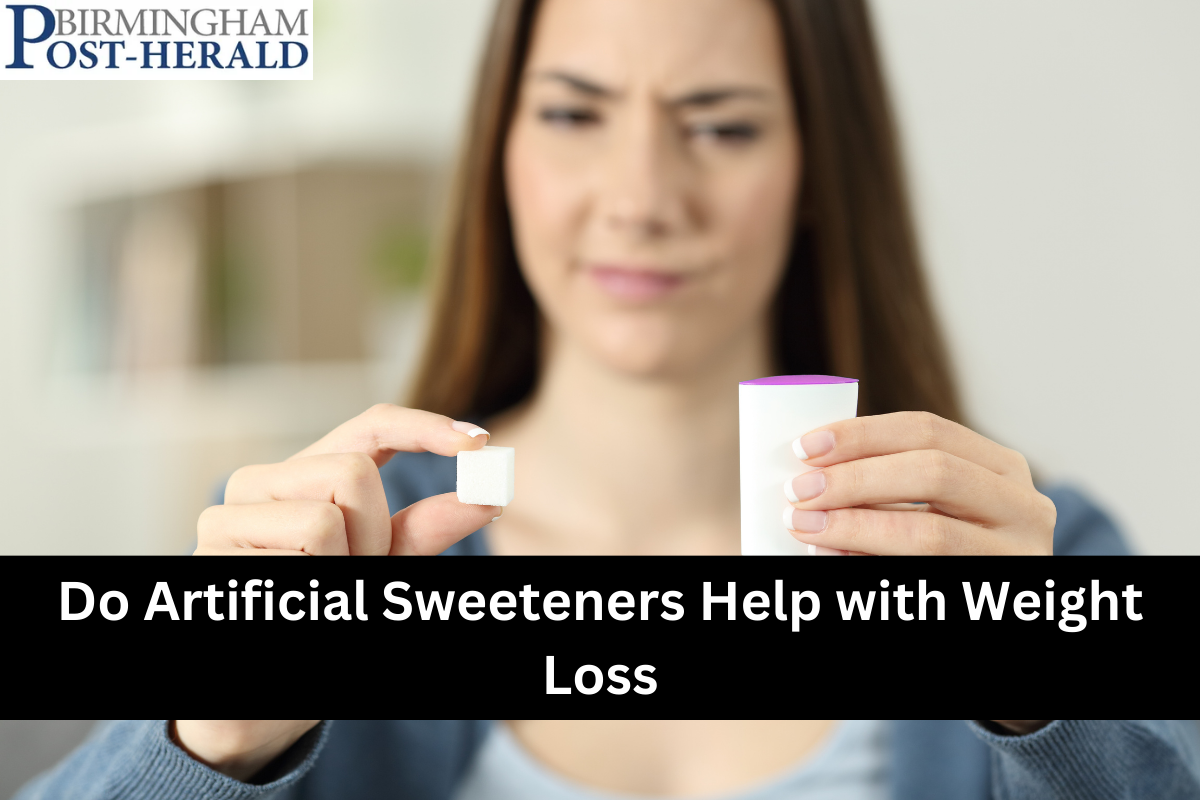Do Artificial Sweeteners Help with Weight Loss :- The use of artificial sweeteners is becoming increasingly popular with people who are trying to live healthier lifestyles and manage their weight. These folks are looking for a way to minimise their calorie consumption without compromising the sweet taste of their food. Aspartame, sucralose, saccharin, and stevia are some examples of sugar substitutes that are becoming increasingly popular in a variety of food and beverage products that are marketed as “diet” or “low-calorie” alternatives. On the other hand, the influence that artificial sweeteners have on weight loss is an issue that is subject to continuing discussion within the scientific community.
Do Artificial Sweeteners Help with Weight Loss

The Promise of Artificial Sweeteners
- Artificial sweeteners are appealing to individuals who are trying to lose weight because they do not include the calories that are connected with sugar but yet deliver the sweetness that sugar does.
- According to the theory, individuals can theoretically reduce their overall calorie consumption by substituting sugar with these replacements. This would result in a caloric deficit, which could potentially lead to weight loss.
- Furthermore, artificial sweeteners are frequently considered to be a good alternative to sugar for individuals who are attempting to regulate their blood sugar levels or who have diabetes. This is due to the fact that they do not have a statistically significant impact on blood glucose levels.
Caloric Reduction and Weight Management
- Improving one’s caloric intake is one of the most fundamental principles of weight management, and the use of artificial sweeteners can be an effective means of accomplishing this objective.
- Individuals are able to enjoy sweet flavours without including any more calories in their diet if they choose products that are sweetened with artificial sweeteners rather than sugar.
- Because it allows for some flexibility while still contributing to overall caloric reduction, this substitution may be especially helpful for individuals who have difficulty adhering to diets that are rigorously regulated in terms of the number of calories they consume.
Behavioral Aspects of Artificial Sweeteners
- Some people believe that the use of artificial sweeteners may influence eating behaviour in ways that are not anticipated, despite the fact that they provide an alternative that is lower in calories.
- As an illustration, the use of items that include artificial sweeteners may cause consumers to compensate by ingesting more calories from other sources, which may potentially counteract the benefits that are intended to be gained from weight loss.
- There is a phenomenon that is referred to as the “compensation hypothesis,” and research has yielded contradictory conclusions regarding whether or not it is true in situations that occur in the actual world.
- Because the brain anticipates a larger caloric intake when it detects sweetness, some studies suggest that people may unconsciously increase their calorie intake from other food sources when they ingest artificial sweeteners.
- This is because the brain takes sweetness as a signal that it should be higher. People may seek more energy from a variety of sources in order to compensate for the lack of calories associated with the sweet taste. This compensation may be motivated by a psychological response to the lack of calories connected with food.
Impact on Hunger and Cravings
- The possible impact of artificial sweeteners on appetite and cravings is another facet of the subject that is being discussed. Artificial sweeteners may interfere with the natural ability of the body to regulate appetite, according to the findings of some research.
- This may result in an increase in sensations of hunger and an increased likelihood of overeating. Although the mechanisms that are responsible for this phenomena are not yet completely understood, it does raise worries about the unforeseen repercussions that may result from relying on artificial sweeteners for the management of one’s metabolism.
- On the other hand, those who advocate for the use of artificial sweeteners contend that these sweeteners can assist fulfil cravings for sweets without adding any more calories, which makes it simpler for individuals to stick to a diet that is lower in calories.
- Particularly for individuals who have a craving for sweets, the ability to indulge in sweet flavours without feeling guilty about consuming an excessive amount of calories could be a factor that contributes to improved compliance with weight loss regimens.
Also see :- Is Safely Losing Weight during Pregnancy
Metabolic Responses to Artificial Sweeteners
- There are a number of factors that influence the equation for weight reduction, one of which is the impact that artificial sweeteners have on metabolism.
- According to the findings of several studies, artificial sweeteners have the potential to change the microbiota in the gut, which is an essential component of digestion and metabolism.
- Alterations in the microbiome of the gut have been linked to metabolic abnormalities, which may have an effect on the regulation of weight.
- Furthermore, research suggests that artificial sweeteners may have an effect on insulin sensitivity, which is an essential component in the functioning of glucose metabolism.
- There are research that suggest that these sweeteners may increase insulin sensitivity; nevertheless, there are other studies that imply that they may have deleterious consequences, which could potentially contribute to metabolic dysfunction.
- Because of the complexity of these interactions, there is a pressing need for additional study to be conducted in order to completely comprehend the metabolic effects that are caused by the intake of artificial sweeteners over the long term.
Individual Variability in Response
- There is a significant amount of variation in individual responses, which is one of the issues that arises when attempting to evaluate the effect that artificial sweeteners have on weight loss. There is a possibility that individuals who consume the same artificial sweeteners may experience different outcomes due to a variety of factors, including heredity, pre-existing metabolic disorders, and personal preferences. The attempts that are being made to create universal standards for the use of artificial sweeteners in weight management are made more difficult by this diversity.
Conclusion
- When trying to lose weight, artificial sweeteners are a double-edged sword. They are a low-calorie alternative to sugar and can help reduce calorie consumption, but concerns regarding compensatory eating, hunger and cravings, and metabolic effects require a sophisticated approach.
- Weight-loss enthusiasts should use artificial sweeteners cautiously, as their effects vary. Artificial sweeteners, a balanced, nutrient-dense diet, and regular exercise are likely to produce the best weight management results.
- Consumers must stay informed, make informed choices based on their needs and preferences, and consult with healthcare professionals for personalized advice on achieving and maintaining a healthy weight as the scientific community continues to study the complex relationship between artificial sweeteners and weight loss.
If you like this Article Do Artificial Sweeteners Help with Weight Loss please Share with your friends And Family members.
